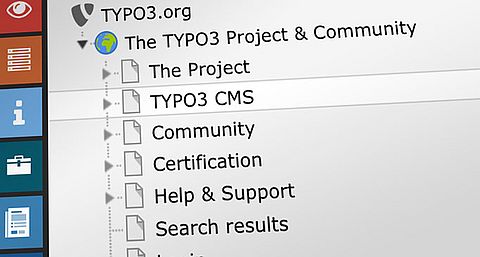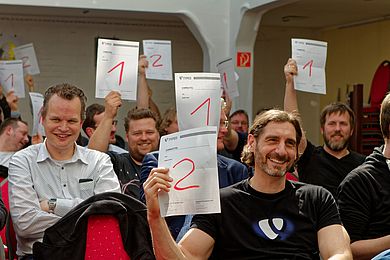Recently more and more tagging solutions have been published. By the sheer number of more or less generic category and tagging attempts it becomes evident that there is a need to find a more flexible solution to categories and tagging in TYPO3.
 In 2009 the project SCOTTY was started by Jo Hasenau to join forces of developers aiming at a better category and tagging system. It soon became evident; that solving the category / tagging problem in TYPO3 may be generalized for a more generic data model which can also represent non-hierarchic ontology systems. Therefore forces were joined with the TYPO3 Phoenix team to develop semantic support and generic models for TYPO3.
In 2009 the project SCOTTY was started by Jo Hasenau to join forces of developers aiming at a better category and tagging system. It soon became evident; that solving the category / tagging problem in TYPO3 may be generalized for a more generic data model which can also represent non-hierarchic ontology systems. Therefore forces were joined with the TYPO3 Phoenix team to develop semantic support and generic models for TYPO3.
On the T3DD10 an initial whole-day workshop was held on SCOTTY. During this meeting a team has been formed. After an additional brainstorming on required features and a general introduction into the basics of semantic web technologies 5 smaller groups worked on different tasks.
The outcome of the workshop was promising: A first scratch of a roadmap and a data model were produced and some basic benchmarking done.
Here is the outcome of the 5 different teams:
Benchmarking of previous category / tagging systems
The category / tagging benchmarking team
The roadmap team was testing a total of 6 generic category- and tagging systems. The outcome of all tests can be read in the Wiki of the SCOTTY project on forge. The 2 most promising extensions where the “tagpack” of Jo Hasenau et all and the extension „Categorize everything“of Georg Ringer et all.
But by the history of past extensions it became also evident that most category extensions have been created to solve a couple of specific problems. Thereafter they have in most cases not been maintained. Also support of the backend was missed in most cases.
Therefore an integration of a generic category and tagging system, developed by joined forces, might be the better choice than individual special use extensions. The complete outcome: <link http: forge.typo3.org projects extension-scotty wiki>forge.typo3.org/projects/extension-scotty/wiki/Previous_%22categoriestags%22_projects .Benchmarking of Semantic CMS solutions outside the TYPO3 world
This benchmarking team identified a number of systems using semantic technologies and then concentrated at Drupal as the most promising CMS.
Drupal offers a taxonomy system that can be used for tags or hierarchically ordered categories. A tag or category has the generalized name of „term“. A „term“ can be assigned to any kind of „vocabulary“. Terms themselves can be non-hierarchical, hierarchical or in a net (one child has several parents) two terms can be marked as identical.
The whole outcome can be read at <link http: forge.typo3.org projects extension-scotty wiki>forge.typo3.org/projects/extension-scotty/wiki/3rd_Party_Evaluation .Development of a future proof database model
We were very happy, that Jochen Rau was coming to the second part of our workshop. Since we aim at easy migration from TYPO3 4.x to TYPO3 5 the database model of SCOTTY has to be compatible with what the TYPO3 5 team is doing. A first sketch of database model was developed during the workshop.
Developing a user interface
The user interface team developed several use cases based on role models like „administrator“, „relations manager“, „editor“ and „frontend user“.
Furthermore they defined two basic approaches to display complex ontologies in the backend: A tree view and a cloud view.
Two wireframes where developed. The results can be seen at <link http: forge.typo3.org projects extension-scotty wiki mockups_for_backend_interfaces>forge.typo3.org/projects/extension-scotty/wiki/Mockups_for_backend_interfaces After the workshop the idea came up to join forces with the ALOHA team that is developing a new Rich Text Editor which will be able to handle semantical stuff as well.The roadmap to semantic TYPO3 4.x/5.x
In the result of this team work a first roadmap to the semantic web project was set up. The first phase „Research“ started with this year's developer days and will approx. last until T3CON10 in Frankfurt. We will be presenting the basic ideas, the roadmap and the technical concept there.
Then a proof of concept will be generated based on technologies of existing extensions, followed by the development of the real SCOTTY project. This one will be based on semantic, future proof data models and make use of ExtBase to ensure a smooth transition to TYPO3 V5.
The overall development of SCOTTY will take approx. 200 work days. If sponsoring will be available to have paid code sprints on a regular base, a development within 1-2 years and therefore until TYPO3 4.8 should be realistic.
After the workshop
 After the workshop was over we kept working on the SCOTTY project. The wiki at forge has been used to document all results of the workshop and to develop further ideas. We concentrate on researching the topic of semantic web and semantic enterprise CMS right now.
After the workshop was over we kept working on the SCOTTY project. The wiki at forge has been used to document all results of the workshop and to develop further ideas. We concentrate on researching the topic of semantic web and semantic enterprise CMS right now.




